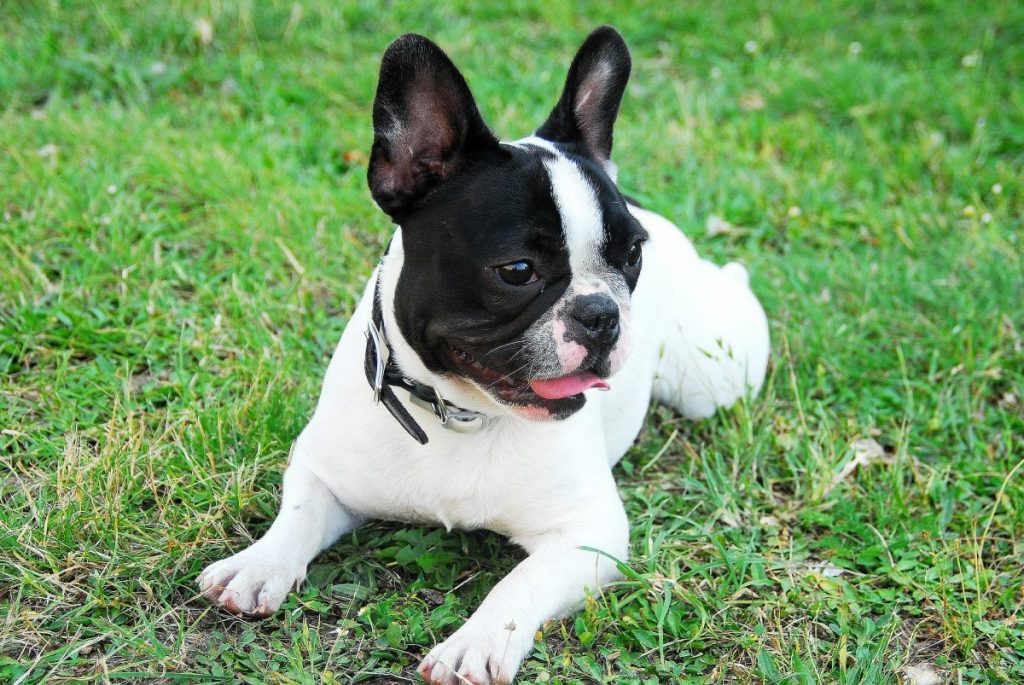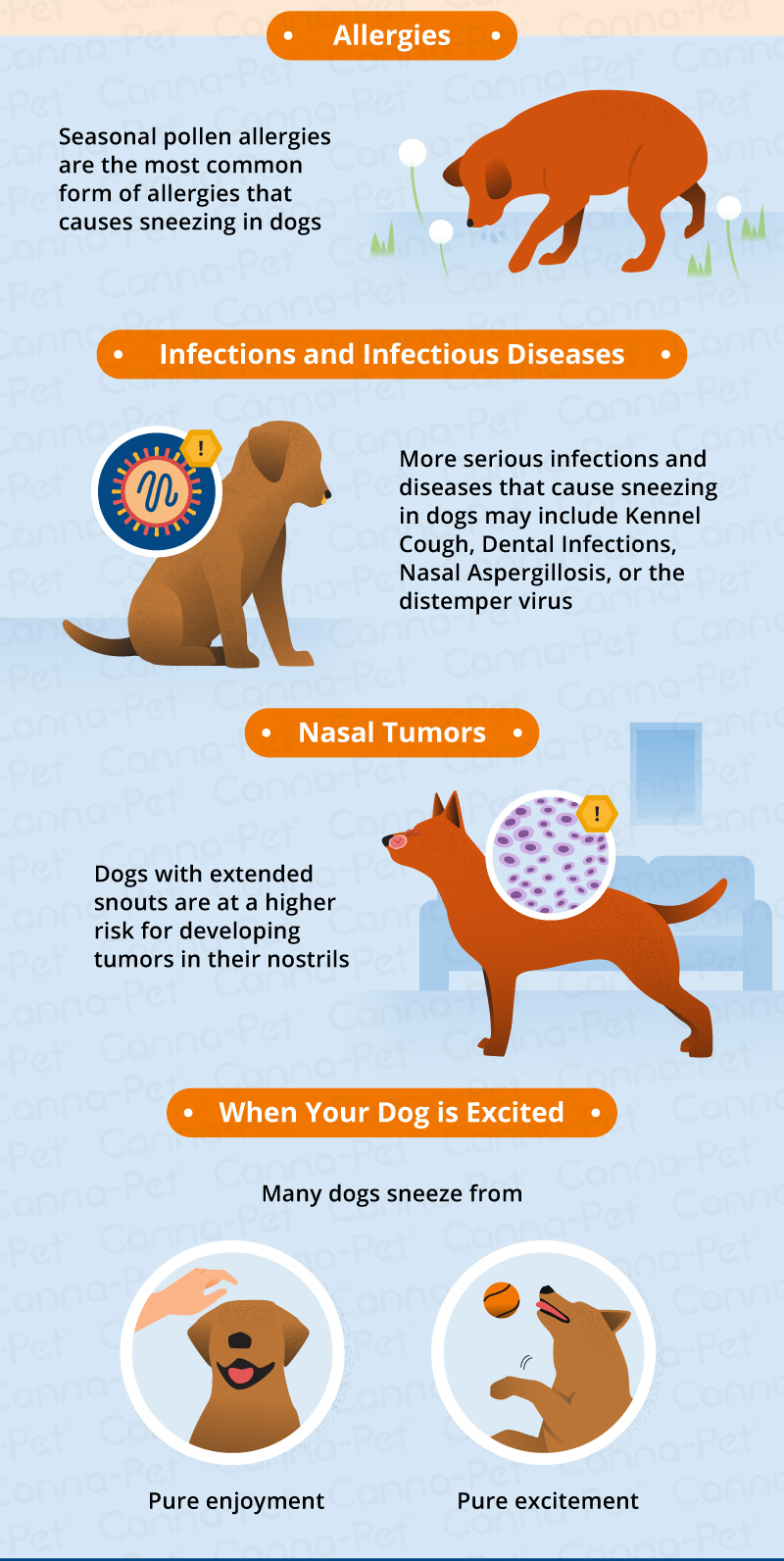Seeing your dog sneeze can be, in some cases, pretty entertaining. Dog sneezes seemingly come out of nowhere, and appear to leave your dog confused in an adorable way. But when your dog starts sneezing regularly, you may find yourself wondering why – and starting to get worried.
Sneezing isn’t as common in dogs as it is in humans, as we react differently to certain ailments. While humans sneeze because of allergies, colds, sinus issues, and even an itchy nose from dust or dryness, dogs are more likely to react to these ailments through their skin. Allergies in dogs often results in itchy skin, eyes, paws and ears.
Dogs are also more likely to cough rather than sneeze when they are suffering from respiratory issues. As a result, dogs generally sneeze less than humans. But they still sneeze.
What Exactly is a Sneeze?
Have you ever thought about why we, and our dogs sneeze? We view sneezing as a sign of sickness or poor health, which is at least partly true. But sneezing is a tactic the body uses to keep itself healthy. When the nasal canal senses “bad” particles building up, the reaction is a sneeze.
Sneezes are involuntary contractions that forcibly expel air from the lungs through the nose and mouth. And while sneezing is often a reaction to bad particles, like viruses, anything that irritates the mucus membrane inside of the nasal passage can cause sneezing. The bottom line: sneezing is beneficial to your dog’s health. But it can be indicative of underlying health issues. What is causing your dog to sneeze? Here are some possible causes of sneezing in dogs:
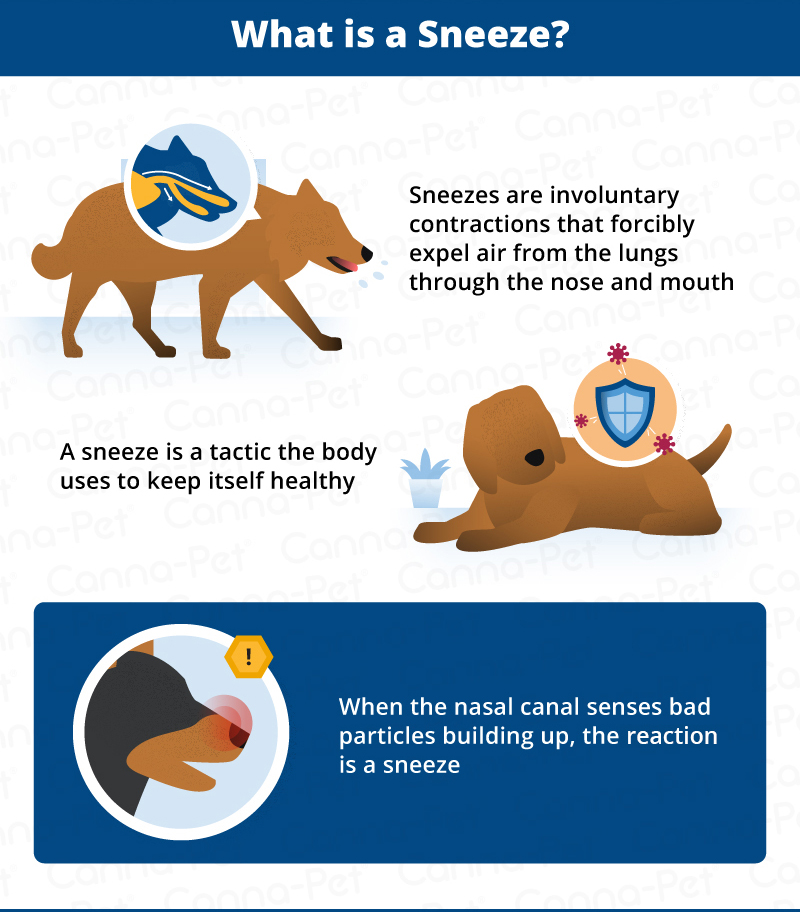
Causes of Sneezing in Dogs
Obstruction of the Upper Airway
You know that incessant, log-sawing snore that your partner does that keeps you up every night? It’s most likely the result of an upper airway obstruction that causes sleep apnea. Dogs can suffer from similar issues. Any excess tissue in the upper airway can cause obstruction that leads to sneezing.
These obstructions can be a result of many factors – including cancer, polyps, or foreign bodies lodged in the nasal passage. But the most common cause of upper airway obstruction is Brachycephalic Syndrome, an airway obstruction condition commonly found in dogs with pushed-in snouts, like Pugs, Bulldogs, and Boxers. Obstructed airways can cause snorting, snoring, and of course, sneezing.
Foreign Objects
The inside of your dog’s nasal passage is lined with tiny hairs that are incredibly sensitive. Any foreign object – including microscopic dust – can trigger sneezing in both dogs and humans. Sneezing is the body’s way of expelling foreign objects from the nasal passage – and it’s quite effective.
Dogs are particularly susceptible to foreign objects in the nasal passage, as they are fond of digging their noses into dirt, sand, trash, and just about anything else they can find. The natural curiosity of the dog, it could be argued, is one of the leading causes of sneezing in dogs.
Nasal Mites
Nasal mites are tiny little bugs that make their homes inside your dog’s nasal passage. Think of them like bed bugs, or head lice. Nasal mites could be the reason your dog is sneezing so much. There’s no sure-fire way to avoid nasal mites, as they are found in places your dog loves to put his snout – namely the dirt.
But a nasal mite infestation can be an uncomfortable ordeal for your dog, causing non-stop itching, sneezing, and even nasal bleeding, depending on the severity. If you think your dog may have nasal mites, your vet will take a nasal swab to determine whether there is an infestation, and determine a treatment plan.
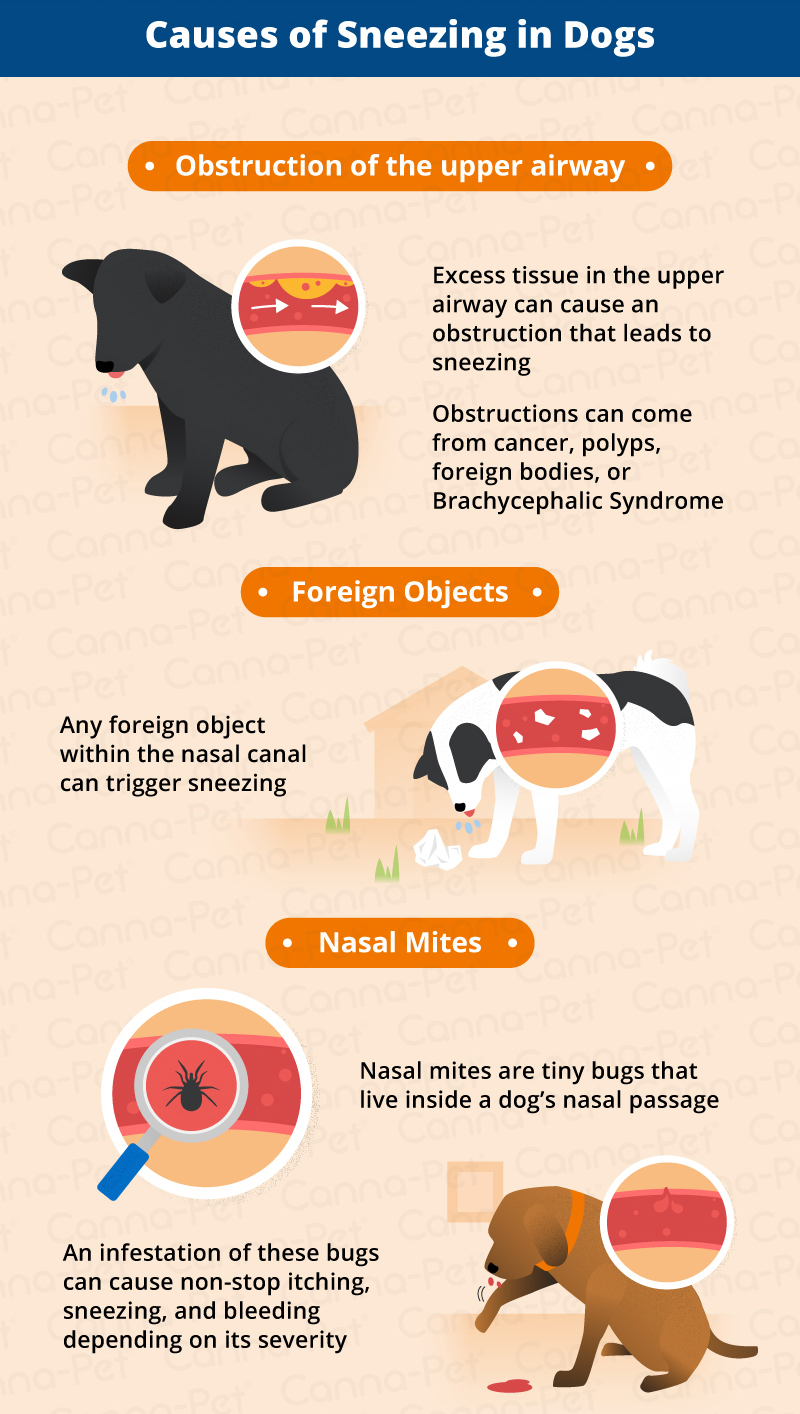
Everyday Irritants
Everything from household cleaners to candles to cigarette smoke can trigger sneezing in dogs. Dog’s noses can be quite sensitive to unnatural household products. It’s important to take note of when your dog is sneezing.
Does he react when you’re cleaning your house with liquid cleaner? Is cigarette smoking causing him to sneeze? Is there too much dust buildup in your home? Identify what is causing your dog to sneeze, and do your best to limit his exposure to those irritants.
Vacuums
Surprisingly enough, your vacuum may also be the culprit behind your dog’s sneezing. Every time a vacuum turns on, it blasts clouds of settled dust to life. For dogs (and humans) with sensitive nasal passages, this can be a problem.
Foxtails
If you live in California, you’re likely familiar with these small, spiked balls of pain. A short hike through a canyon can leave you and your dog covered in them. Late in the spring, Foxtail plants dry out and send their prickly buds blowing across the landscape – and they’re particularly attracted to dogs. Your dog may end up with Foxtails in his fur, embedded into his paws, or any other orifice they can find – including your dog’s nostrils.
Once a Foxtail lodges itself into your dog’s nasal cavity, he will likely start sneezing uncontrollably. At this point, it will likely be difficult for you to remove it. Seeking help from a vet or an emergency veterinary center is your best bet.
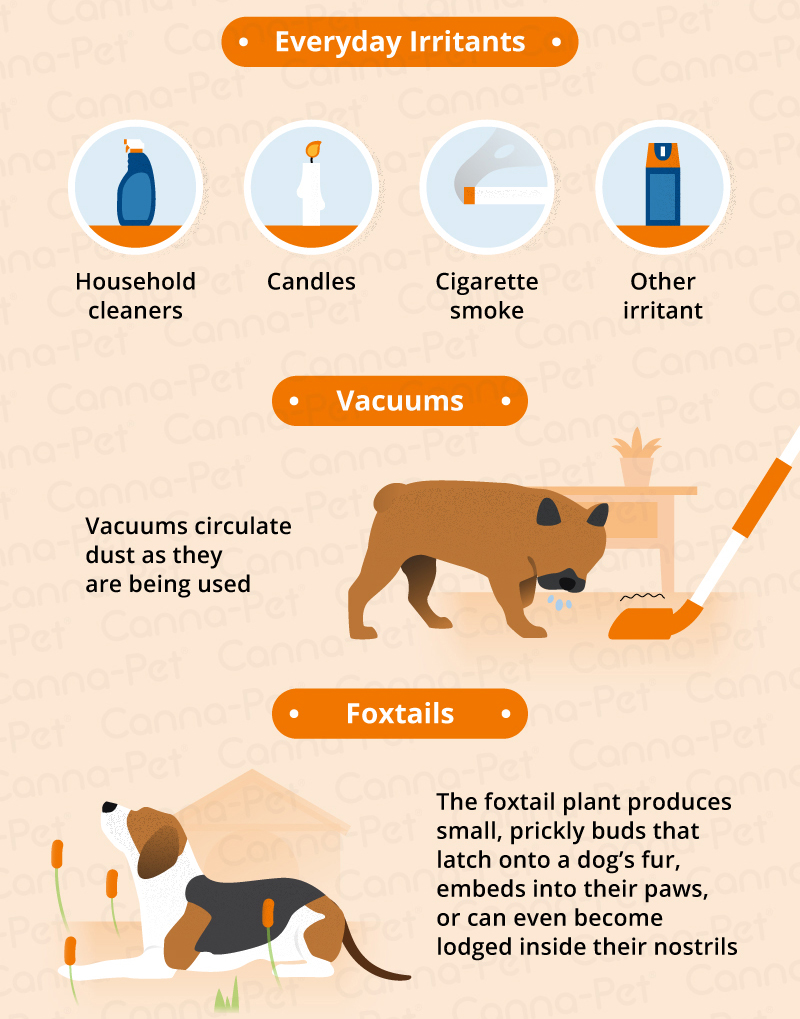
Allergies
As we noted, dogs do not always react in the same way as humans do to allergies. But certain allergies do indeed cause dogs to sneeze. Much like humans, seasonal pollen allergies – usually in spring and summer – are the most likely to cause dogs to sneeze.
If your dog suffers from seasonal allergies, it will be easy to diagnose. The sneezing will last about two to four weeks, and is usually accompanied by watery eyes, chewing on paws, and excessive scratching.
Infections and Infectious Diseases
In some cases, excessive sneezing in dogs may be indicative of a more serious issue. There are a variety of infections and infectious diseases that reveal themselves through dog’s sneezes – particularly those in the upper respiratory, like Kennel Cough. With upper respiratory infections, coughing is often present along with sneezing.
Dental infections, where a rotting tooth protrudes upward into the nasal passage, can cause sneezing. So can Nasal Aspergillus, which is developed through direct contact of fungus to a dog’s nose. Some infections that induce sneezing, unfortunately, can be serious. The distemper virus, for instance, can cause sneezing, and is often deadly.
Some infections are short-term, much like the cold virus in humans, while others can be chronic conditions. If your dog sneezes for an extended period of time, you should seek veterinary care to determine the root cause of the sneezing, and determine a plan for care.
Nasal Tumors
As scary as nasal tumors sound, they’re fairly common – especially in dogs with longer snouts, like Collies and Irish Wolfhounds. Intranasal tumors generally happen with older dogs over eight years of age. These tumors can cause your dog to sneeze, as they obstruct the nasal pathways.
While most tumors don’t metastasize into cancer, they grow continuously, causing your dog’s sneezing to slowly increase as they do. Sneezing from intranasal tumors is usually accompanied by other symptoms, including bloody discharge from the nose. Tumor growth can be a slow process, so keep an eye on your dog if you sense something abnormal is going on.
Dogs with bloody noses should always be taken in for veterinary care. Surgery can be difficult in the nasal canal, but your vet may be able to recommend alternative treatments to help make your dog more comfortable.
Your Dog is Excited
Just because your dog is sneezing doesn’t necessarily mean he is sick. Many dogs sneeze from pure joy and excitement! Small dogs, in particular, tend to show their excitement with a sneeze. Whether it’s anticipation for a treat, a trip to the park, or just an expression of their excitement to see you, sneezing can be a positive – and adorable – reaction from a happy dog!
The Reverse Sneeze
Have you ever seen your dog sneeze, but make a strange, honking sound instead of the normal “ahhh-choo?” It could be a “reverse sneeze” – which is technically not a sneeze at all. The reverse sneeze has a technical term: mechanosensitive aspiration reflex.
The reverse sneeze is a common occurrence, especially in smaller dogs and brachycephalic breeds, like Pugs, Shih Tzus, and Lhasa Apsos. The sound a reverse sneeze makes can be troubling for dog owners. It may sound like your dog is chocking or suffering from an asthma attack.
These events are normally brief, but can last a couple of minutes. They are not life threatening and not cause to rush your dog to an emergency vet. However, if your dog experiences repeated episodes of reverse sneezing, you should take him in for a visit to the vet to determine the underlying cause of the issue.
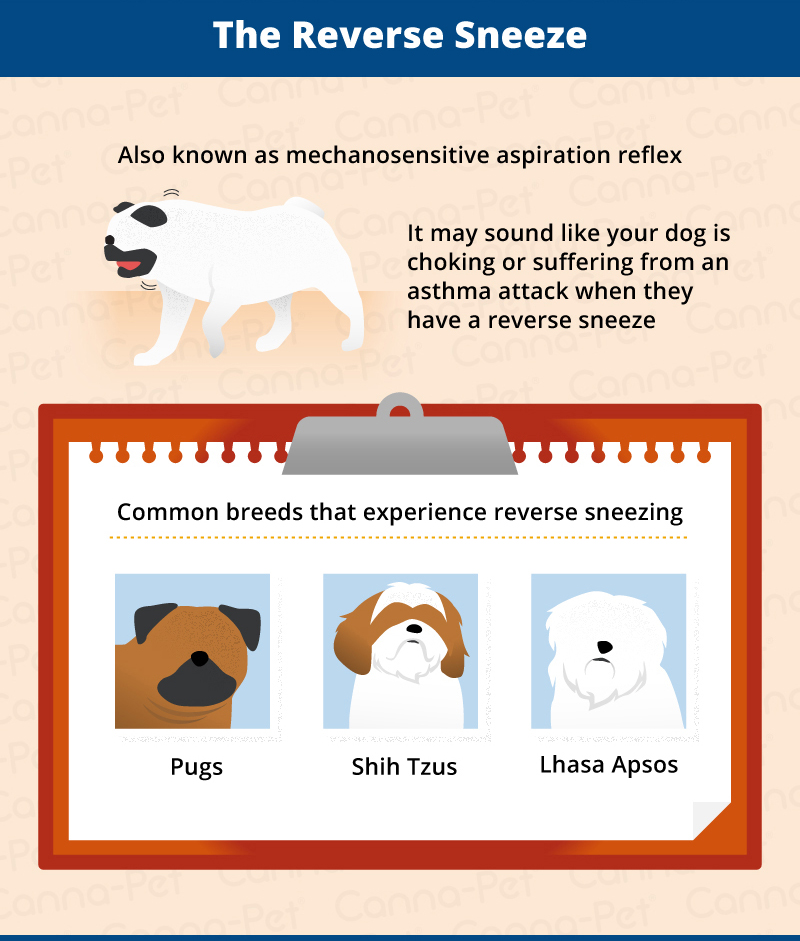
Dog Sneezing: What to Look for
Sneezing is normal for both humans and dogs. But if your dog is sneezing an inordinate amount, there’s likely a larger issue at hand. It’s always a good idea to seek veterinary help if you suspect your dog’s sneezing is the result of a health issue or illness. There are a few things to watch out for that can help you determining whether your dog has an issue beyond normal sneezing, including:
Discharge: If your dog’s sneezing is accompanied by a thick yellow or green discharge from the nose, eyes, or mouth, there is most likely an underlying health issue that is causing it. Mucus discharge can signal a variety of different issues. If the discharge lasts more than one day, you should schedule an appointment with your vet for diagnoses and treatment.
Swelling: Does your dog’s face look asymmetrical or bloated? Insect and animal bites can cause your dog’s face to swell, and bring on sneezing incidents. If you notice swelling in your dog’s face, monitor him to ensure the swelling does not increase. If it does, seek immediate medical attention. Minor stings from insects, like bees, will generally subside after a few hours. But a bite from something more serious, like a rattlesnake, can be life threatening.
Bleeding: Bleeding from the nostrils is rarely caused from constant sneezing, but it can be increased by sneezing. If you notice blood in your dog’s nostrils, seek treatment from a vet.
Breathing Issues: An inflammation or obstruction of your dog’s nasal airways can cause sneezing, and is normally a reaction to an underlying medical issue. In many cases, these issues are not serious, and are similar to the common cold in humans. Minor inflammation is often treated with over-the-counter antihistamines, but you should always consult a vet before administering any type of medication to your dog.
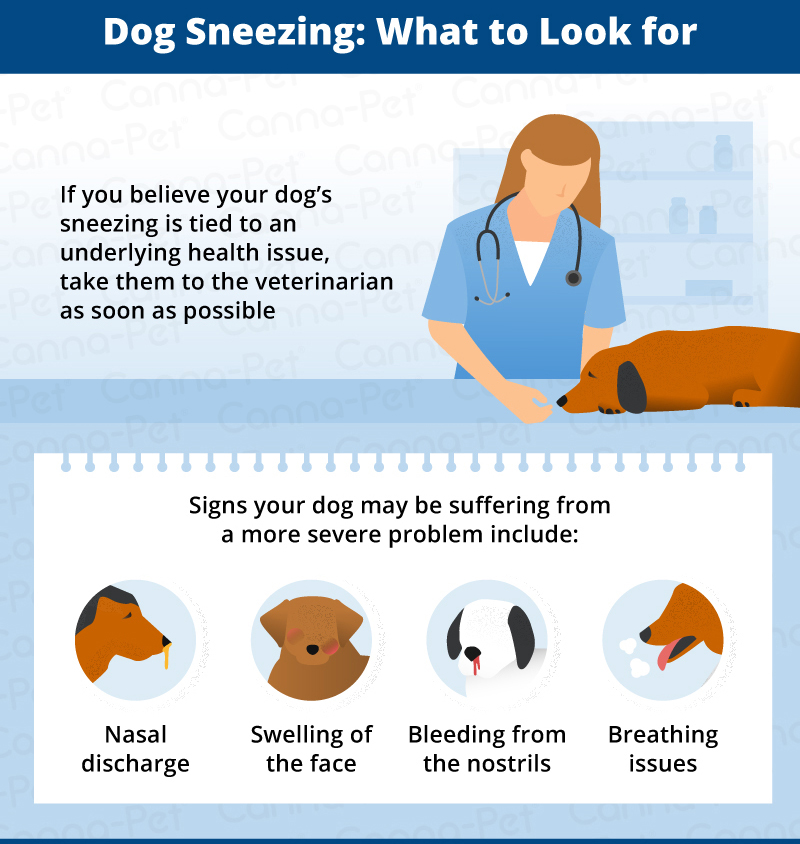
What to Do When Your Dog Sneezes
Sneezing happens. Often. It’s a normal part of life for dogs, humans, and various other creatures across the globe. We care so deeply for our dogs, that sometimes we can be a little overprotective, and worry too much about minor issues.
More often than not, sneezing in dogs is not cause for worry. Rather than worry, you should use your dog’s sneezing as an opportunity to become more familiar with his health and personality. Keep a close eye on your dog when sneezing occurs, and do your best to determine if veterinary examination is necessary or not.
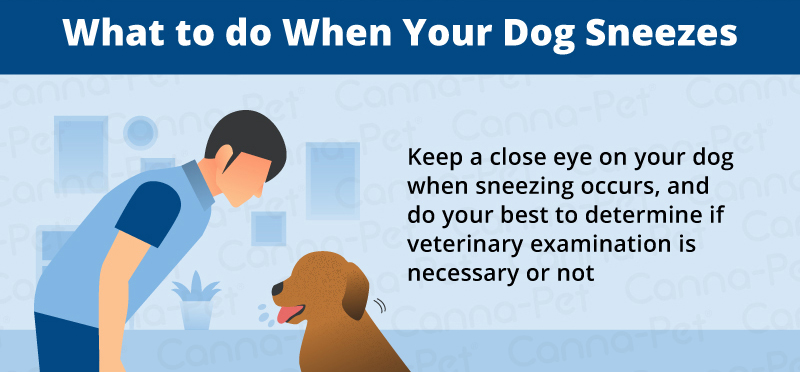
Sources:
- “Common Causes of Sneezing in Dogs.” Healthy Pets, Accessed 19 April 2017. www.healthypets.mercola.com/sites/healthypets/archive/2016/08/03/dog-sneezing.aspx.
- “My Pet Is Sneezing and Snorting. What’s Going On?” Vetstreet, 16 Sept. 2011, Accessed 19 April 2017. www.vetstreet.com/care/my-pet-is-sneezing-and-snorting-whats-going-on.
- Peña, Melvin. “Why Is Your Dog Sneezing?” Dogster, 20 Feb. 2018, Accessed 19 April 2017. www.dogster.com/dog-health-care/why-do-dogs-sneeze.
- “Sneezing in Dogs – Definition, Cause, Solution, Prevention, Cost.” WagWalking, 3 May 2017, Accessed 19 April 2017. www.wagwalking.com/symptom/why-is-my-dog-sneezing.
- “Reverse Sneezing In Dogs: Is It Normal?” PetMD, Accessed 19 April 2017. www.petmd.com/dog/general-health/reverse-sneezing-dogs-it-normal.

